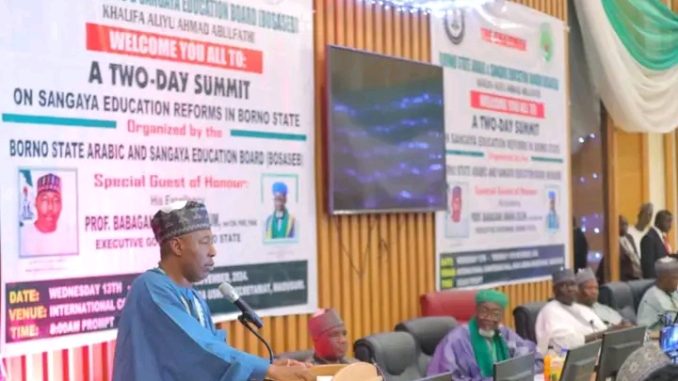
Borno State governor, Prof Babagana Umara Zulum has talked on the contributing factor to the root cause of Boko-Haram terrorism in his state.
He did that when he opened a summit for Almajiri education system reforms, aimed at transforming the Almajiri system in the state.
Also known as Tsangaya, the Almajiri education is a traditional and informal Islamic learning method prevalent in northern Nigeria.
The summit, a two days program started on Wednesday at International Conference Hall, Musa Usman Secretariat, Maiduguri.
During the summit, the state Governor, Zulum emphasizes on the need to reform the Almajiri system of learning to ensure adequate and excellent Islamic teachings and the promotion of education at large.
He also stressed on the critical role of education in addressing the root causes of terrorism and insecurity in the state.
In a press statement by his spokesman, Malam Dauda Iliya, the governor highlighted the potential negative impact of improper Islamic teachings, citing it as a contributing factor to the rise of extremist groups like Boko Haram.
The statement said the Government of Borno State has established the Arabic and Tsangaya Education Board to mitigate the challenges associated with the Almajiri system.
The board is responsible for implementing a unified curriculum for Islamic schools, incorporating both religious and secular subjects.
The government’s reform efforts also involved establishing Higher Islamic Colleges specifically designed for Almajiri children.
These colleges will provide a comprehensive education, equipping students with both Islamic knowledge and practical skills necessary for future employment opportunities.
The summit, held at the Musa Usman Secretariat, brought together key stakeholders, including education experts, religious leaders, and community advocates, to discuss innovative approaches to integrate the Almajiri system with formal education.
Stating further, the governor added that ‘The Tsangaya reform is a great development and will give Almajiri a better chance in life, particularly the introduction of integrating western education, vocational, numeracy and literacy skills into the centres.’
He further emphasized the government’s goal of streamlining the informal and formal education systems to create a high-quality integrated school system that prepares students for higher education.
The summit provided a valuable platform for participants to share insights, discuss challenges, and propose actionable solutions to improve the Almajiri education system.
Speaking at the summit, Khalifa Ali Abulfathi, the chairman of board, expressed gratitude to Governor Zulum for giving the board the necessary support in discharging its duties.
Also at the program, guest speakers, Professor Mustapha Gwadabe from Ahmadu Bello University, Zaria, and Professor Mohammed Alhaji from the University of Maiduguri stressed the urgent need for a comprehensive overhaul of the Almajiri system.










